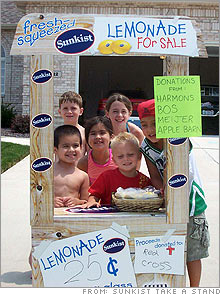Littlest entrepreneurs turn lemons into lemonadeLemonade stands are a great way for kids to earn some pocket change. It's also ideal for grooming young business-starters.NEW YORK (CNNMoney.com) -- Whether it's fresh-squeezed, store-bought or from a mix, lemonade is a hot seller in the summer months and a lot of kids touting the tart treat can watch the profits pour in. As the weather gets warmer, more youngsters will be heading to the sidewalk to set up their stands and, along the way, learn invaluable lessons about business, finance, and maybe even philanthropy.
"Almost everybody I ever met that was a successful entrepreneur started a business as a kid," said Steve Mariotto, president and founder of the National Foundation for Teaching Entrepreneurship, "and lemonade stands are probably the most common business (for children) in the country." A lemonade stand is a "classic American business" that teaches children about sales, budgeting, record keeping, advertising and interpersonal relationships, according to Mariotto. Running a stand is "one of the most educational experiences a child can have," he said. And more and more kids are not just profiting from the experience, but also learning the importance of giving back by donating a portion - or all - of their proceeds to charity. "If children can take part of the revenue and contribute it to a charity, even better," Mariotto said. He recommends teaching children to donate 5 percent of what they earn to make philanthropy a habit. Laurie Lawry, a teacher at Shamrock Springs Elementary school in Westfield, Ind., helped her second graders organize and operate a lemonade stand during recess to teach them some real-world economics lessons. In preparation, she split her students into five groups including drink servers, money managers, runners/messengers, an entertainment committee, and an advertising committee that printed flyers and promoted the sale in advance reminding kids to bring in change for the event. One day last week, the 19 students in her class, all between the ages of 7 and 8, sold 776 cups of lemonade, or 30 gallons, to their fellow classmates at 25 cents a cup. The class decided to donate the money they made to the Plaquemines Parish schools in Port Sulphur, La., which had been badly damaged by Hurricane Katrina. It was a charity close to the heart of their principal, Chris Baldwin. "You can talk about economics in class," Lawry said, "but to be able to do something in the real world, on such a grand scale, was great." Nobody knows that better than Elizabeth Scott. In the summer of 2000, her daughter Alexandra, a 4-year-old cancer patient, sold lemonade from her front lawn to raise money to help her hospital find a cure for kids with cancer. Since then, Alex's cause has become a nationwide fundraising movement. Now Scott says she is committed to continuing her daughter's legacy through Alex's Lemonade Stand Foundation, which has raised $11 million for childhood cancer research so far. She hopes to raise $6 million this summer. "For a lot of kids, it's their first experience getting involved, learning about working together and learning to be sensitive to children that are sick," Scott said. Big businesses are also jumping on the bandwagon. Some of the foundation's sponsors include BJ's Wholesale Club (Charts, Fortune 500) and Applebee's (Charts). Sunkist has been offering lemonade stands to children between the ages of 7 and 12 who commit to donate a portion of their proceeds to a cause of their choice. Since its inception in 2004, Sunkist's program has helped raise $1.5 million for charity. Free stands are given to the first 10,000 kids who apply at www.sunkist.com/takeastand. The site also includes information on how to run a successful stand. |
Sponsors
|

